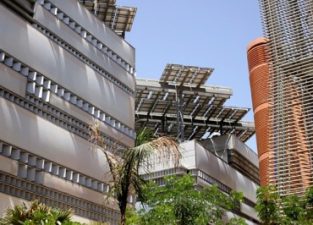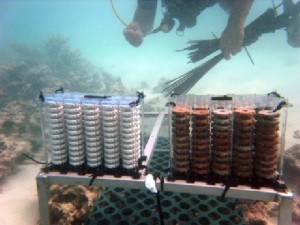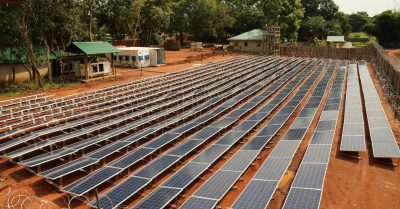 Bristol scientists hope to build an autonomous robot that runs by digesting energy-rich waste products
Bristol scientists hope to build an autonomous robot that runs by digesting energy-rich waste products
As we begin to consider alternative sources of energy for the Middle East, where even oil-rich Saudi is developing its solar sector, diversifying our portfolio will take pressure off any one source and generate further safety nets. Technology developed for space missions can clean solar panels and make them more effective, and new mini-turbines are sufficiently quiet and aesthetically pleasing to use in residential applications. But we haven’t yet considered using urine to create fuel cells. Researchers at the Bristol Robotics Lab (BRL) have, and hope to use their Microbial Fuel Cells (MFCs) already capable of running on other forms of waste for outdoor applications such as music festivals.
The robot guinea pig
With a four-year EPSRC Career Acceleration Fellowship Grant worth £564,561, Dr. Ioannis Ieropoulos and fellow scientists will further develop an already tested technology that uses waste products to produce energy. Ecobot III – the robotic guinea pig – should then be able to run autonomously by digesting waste.
MFCs have already been proven to run on products such as dead flies, rotten fruit, grass clippings, and prawn shells, according to Dr. Ieropoulos. But the researchers have already conducted preliminary research that suggests that urine, too, can produce significant energy.
“We have focused on finding the best waste materials that create the most energy. Urine is chemically very active, rich in nitrogen and has compounds such as urea, chloride, potassium and bilirubin, which make it very good for the microbial fuel cells, Dr. Ieropoulos explained to Science Daily.
Closed loop
The fuel cells consist of an anode and a cathode, which interaction creates a closed loop to generate power. In order to make the technology self-sustaining, scientists will attempt to use oxygen-producing algae rather than chemicals for the cathode portion of the fuel cell. The waste product of this algae will then feed the bacteria, or anode.
They also hope to create a stack of connected, but individual MFCs, in order to generate more efficiency and productivity. The MFCs will be connected electrically and through liquid feedlines, but this is challenging, according to SD, because the MFCs need to retain their isolation even as the liquid feedlines flow constantly.
“Though it is early days for this research, we hope to work towards producing a prototype portable urinal which would use urine to create power from fuel cells. We envisage that this could be used for example at music festivals and other outdoor events,” says Dr. Ieropoulos.
A waterless urinal company – Ecoprod Technique – is already eyeballing the technology, believing it to be the twin sister of their own design.
The human ecosystem
While the idea of using urine to create fuel cells might seem strange, initially, it reflects a willingness to tap into the jewels of the human ecosystem, which is its own closed loop. Why not take advantage of this prolific resource, especially during hot Middle Eastern summers when we consume, and pass, many fluids to stay hydrated?
:: image via broma and story via Science Daily
More Cleantech stories:




Peee! Well of course…As long as we have water and food, we’ll be able to produce this.
In the waterless urinal!
Hey Tafline, as a Bristolian, living not far from UWE where this research is happening, I’m saving all my pee from now on!
Where are you saving it? Just wonderin…